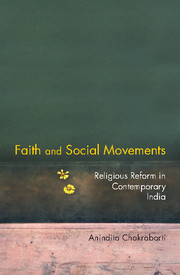Book contents
Conclusion: Religion, Movements and Secularity
Published online by Cambridge University Press: 28 February 2018
Summary
The book revolves around two movements, belonging to two different religions. It raises the question: what are the issues at stake in the study of religious movements? Jettisoning the self-fulfilling prophecies of Islamization and Sankritization, the intellectual labour has been to move beyond the paradigms of Great and Little traditions and their concomitant binaries. It draws attention to the difficulty of appraising movements such as Svadhyaya and the Tablighi Jamaat that lie outside the purview of movements of modernity. The secularization thesis might have backed off in the face of what is today popularly described as ‘resurgence of religion’ but the relation between religion and the ideal of the ‘secular–liberal’ has remained on tenterhooks. James Spickard has evocatively described the discourse on religion in contemporary times as the proverbial story of the five blind men and the elephant. Religion is many things: expanding, declining, changing its shape and nature, or merely responding to changes in the markets: all at once. Very often, one view contradicts the other and that is the funny part: not like the original story, where the humour lies in knowing what the elephant looks like in totality. Drawing attention to the larger academic politics of knowledge generation, Spickard shows how the five narratives ranging from secularization to the rise of fundamentalism; religious reorganization, individualization and rationalchoice theory of religious markets, vie for academic space (2006: 169–178).
In the Indian context, the struggle has been to find an academic space for religion as an object of sociological enquiry. Case studies from India remain absent in the state-of-the-art publications on sociology of religion.1 Religion enters the social science discourse as a question of identity politics, communalism and fundamentalism or contrariwise, it is placed ‘far outside history and society, time and place.’ Approaching religion from the point of view of method, Andre Beteille has argued that it is not surprising that the rise of sociology coincides with the decline of theology in Europe.
- Type
- Chapter
- Information
- Faith and Social MovementsReligious Reform in Contemporary India, pp. 178 - 194Publisher: Cambridge University PressPrint publication year: 2017



